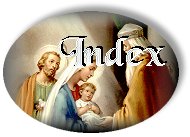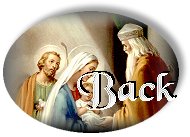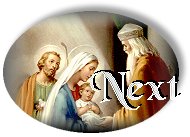CONGREGATION FOR THE CLERGY
DIRECTORIUM PRO MINISTERIO ET
VITA DIACONORUM PERMANENTIUM
DIRECTORY
FOR THE MINISTRY AND LIFE
OF PERMANENT DEACONS
1
THE
JURIDICAL STATUS OF THE DEACON
Sacred Minister
-
1. The origin of the diaconate is the consecration and
mission of Christ, in which the deacon is called to share.(34) Through
the imposition of hands and the prayer of consecration, he is constituted
a sacred minister and a member of the hierarchy. This condition determines
his theological and juridical status in the Church.
Incardination
-
2. At the time of admission to the diaconate, all candidates
shall be required to express clearly in writing their intention to serve
the Church(35) for the rest of their lives in a specific territorial or
personal circumscription, in an institute of consecrated life or in a society
of apostolic life which has the faculty to incardinate.(36) Written acceptance
of a request for incardination is reserved to him who has authority to
incardinate and determines the candidate's Ordinary.(37)
Incardination is a juridical bond. It has ecclesiological
and spiritual significance in as much as it expresses the ministerial dedication
of the deacon to the Church.
-
3. A deacon already incardinated into one ecclesiastical
circumscription may be incardinated into another in accordance with the
norm of law.(38) Written authorization must be obtained from both the bishop
a quo and the bishop ad quem in the case of deacons who, for just reasons,
wish to exercise their ministry in a diocese other than that into which
they were incardinated. Bishops should encourage deacons of their own dioceses
who wish to place themselves either permanently or for a specified time
period at the service of other particular Churches with a shortage of clergy.
They should also support in a particular way those who, after specific
and careful preparation, seek to dedicate themselves to the missio ad gentes.
The terms on which deacons afford such service should be duly regulated
by contract and agreed upon by the bishops concerned.(39)
It is a duty incumbent on the bishop to care for the
deacons of his diocese with particular solicitude.(40) This is to be discharged
either personally or through a priest acting as his delegate. Special pastoral
care should always be shown to those in particular difficulties because
of personal circumstances.
-
4. The deacon incardinated into an institute of consecrated
life or society of apostolic life shall exercise ministry under the jurisdiction
of the bishop in all that pertains to the pastoral ministry, acts of public
worship and the apostolate. He is, however, also subject to his own superiors'
competence and to the discipline of his community.(41) When a deacon is
transferred to a community in another diocese, the superior shall be obliged
to present him to the local Ordinary and obtain permission for him to exercise
his ministry in accordance with the procedures agreed upon, between the
bishop and the superior.
-
5. The specific vocation to the permanent Diaconate presupposes
the stability of this Order. Hence ordination to the Priesthood of non-married
or widowed deacons must always be a very rare exception, and only for special
and grave reasons. The decision of admission to the Order of Presbyters
rests with the diocesan bishop, unless impediments exist which are reserved
to the Holy See.(42) Given the exceptional nature of such cases, the diocesan
bishop should consult the Congregation for Catholic Education with regard
to the intellectual and theological preparation of the candidate, and also
the Congregation for the Clergy concerning the programme of priestly formation
and the aptitude of the candidate to the priestly ministry.
-
6. By virtue of their ordination, deacons are united to
each other by a sacramental fraternity. They are all dedicated to the same
purpose — building up the Body of Christ — in union with the Supreme Pontiff(43)
and subject to the authority of the bishop. Each deacon should have a sense
of being joined with his fellow deacons in a bond of charity, prayer, obedience
to their bishops, ministerial zeal and collaboration.
With the permission of the bishop and in his presence
or that of his delegate, it would be opportune for deacons periodically
to meet to discuss their ministry, exchange experiences, advance formation
and encourage each other in fidelity. Such encounters might also be of
interest to candidates to the permanent Diaconate. The local Ordinary should
foster a "spirit of communion" among deacons ministering in his diocese
and avoid any form of "corporatism" which was a factor in the decline and
eventual extinction of the permanent Diaconate in earlier centuries.
-
7. The Diaconate brings with it a series of rights and
duties as foreseen by canons 273-283 of the Code of Canon Law with regard
to clerics in general and deacons in particular.
-
8. The rite of ordination includes a promise of obedience
to the bishops: "Do you promise respect and obedience to me and to my successors?".(44)
In making this promise to his bishop the deacon takes Christ, obedient
par excellence (cf. Phil 2: 5-11), as his model. He shall conform his own
obedience in listening (Hb 10, 5ff; John 4:34) and in radical availability
(cf. Lk 9:54ff and 10:1ff) to the obedience of Christ. He shall therefore
dedicate himself to working in complete conformity with the will of the
Father and devote himself to the Church by means of complete availability.(45)
In a spirit of prayer, with which he should be permeated, the deacon, following
the example of the Lord who gave himself "unto death, death on a cross"
(Phil 2:8), should deepen every day his total gift of self. This vision
of obedience also predisposes acceptance of a more concrete detailing of
the obligation assumed by the deacon at ordination, in accordance with
the provisions of law: "Unless excused by a lawful impediment, clerics
are obliged to accept and faithfully fulfil the office committed to them
by their Ordinary".(46) This obligation is based on participation in the
bishop's ministry conferred by the Sacrament of Holy Orders and by canonical
mission. The extent of obedience and availability is determined by the
diaconal ministry itself and by all that is objectively, immediately and
directly in relation to it.
The Deacon receives office by a decree of the bishop.
In his decree of appointment, the bishop shall ascribe duties to the deacon
which are congruent with his personal abilities, his celibate or married
state, his formation, age, and with his spiritually valid aspirations.
The territory in which his ministry is to be exercised or those to whom
he is to minister should be clearly specified. The decree must also indicate
whether the office conferred is to be discharged on a partial or full-time
basis and the priest who has the "cura animarum" where the deacon's ministry
is exercised, must be named.
-
9. Clerics are obliged to live in the bond of fraternity
and of prayer, collaborate with each other and with the bishop to recognize
and foster the mission of the faithful in the Church and in the world(47)
and live in a simple, sober manner which is open to fraternal giving and
sharing.(48)
-
10. Unlike deacons to be ordained to the priesthood,(49)
who are bound by the same norms as priests in the matter,(50) permanent
deacons are not obliged to wear clerical garb. Deacons who are members
of institutes of consecrated life or societies of apostolic life shall
adhere to the norms prescribed for them by the Code of Canon Law.(51)
-
11. In its canonical discipline, the Church recognizes
the right of deacons to form associations among themselves to promote their
spiritual life, to carry out charitable and pious works and pursue other
objectives which are consonant with their sacramental consecration and
mission.(52) As with other clerics, deacons are not permitted to found,
participate in or be members of any association or group, even of a civil
nature, which is incompatible with the clerical state or which impedes
the diligent execution of their ministerial duties. They shall also avoid
all associations whose nature, objectives and methods are insidious to
the full hierarchical communion of the Church. Likewise, associations which
are injurious to the identity of the diaconate and to the discharge of
its duties for the Church's service, as well as those groups or associations
which plot against the Church, are to be avoided.(53)
Associations too which, under the guise of representation,
organize deacons into a form of trade(s) unions or pressure groups, thus
reducing the sacred ministry to a secular profession or trade, are completely
irreconcilable with the clerical state. The same is true of any form of
association which would prejudice the direct and immediate relationship
between every deacon and his bishop.
All such associations are forbidden because they are
injurious to the exercise of the sacred ministry, which, in this context,
is considered as no more than a subordinate activity, and because they
promote conflict with the bishops who are similarly regarded purely as
employers.(54)
It should be recalled that no private association
may be considered an ecclesial association unless it shall have obtained
prior recognitio of its statutes by the competent ecclesiastical authority.(55)
Such authority has the right and duty to be vigilant concerning associations
and the fulfillment of their statutory ends.(56)
Deacons who come from ecclesial associations or movements
may continue to enjoy the spiritual benefits of such communities and may
continue to draw help and support from them in their service of a particular
Church.
-
12. The professional activity of deacons assumes a significance
which distinguishes it from that of the lay faithful.(57) Thus the secular
work of permanent deacons is in some sense linked with their ministry.
They should be mindful that the lay members of the faithful, in virtue
of their own specific mission, are "particularly called to make the Church
present and fruitful in those places and circumstances where it is only
through them that she can become the salt of the earth".(58)
Derogating from what is prescribed for other clerics,(59)
the present discipline of the Church does not prohibit to permanent deacons
professions which involve the exercise of civil authority or the administration
of temporal goods or accountable secular offices. Particular law, however,
may determine otherwise, should such derogation prove inopportune.
In those commercial and business activities(60) permitted
under particular law, deacons should exhibit honesty and ethical rectitude.
They should be careful to fulfil their obligations to civil law where it
is not contrary to the natural law, to the Magisterium or to the canons
of the Church and to her freedom.(61)
The aforementioned derogation is not applicable to
permanent deacons who are incardinated into institutes of consecrated life
or societies of apostolic life.(62)
Permanent deacons must make prudent judgements and
they should seek the advice of their bishops in more complex instances.
Some professions, while of undoubted benefit to the community, can, when
exercised by a permanent deacon, in certain circumstances, become incompatible
with the pastoral responsibilities of his ministry. The competent authority,
bearing in mind the requirements of ecclesial communion and of the fruitfulness
of pastoral ministry, shall evaluate individual cases as they arise, including
a change of profession after ordination to the permanent Diaconate.
Where there is conflict of conscience, deacons must
act in conformity with the doctrine and discipline of the Church, even
if this should require of them great sacrifices.
-
13. As sacred ministers, deacons are required to give
complete priority to their ministry and to pastoral charity and "do their
utmost to foster among people peace and harmony based on justice".(63)
Active involvement in political parties or trades unions, in accordance
with the dispositions of the Episcopal Conference,(64) may be permitted
in particular circumstances "for the defense of the rights of the Church
or to promote the common good".(65) Deacons are strictly prohibited from
all involvement with political parties or trade(s) union movements which
are founded on ideologies, policies or associations incompatible with Church
doctrine.
-
14. Should a deacon wish to absent himself from his diocese
for "a considerable period of time", he should normally obtain the permission
of his Ordinary or Major Superior in accordance with the provisions of
particular law.(66)
-
15. Deacons who are professionally employed are required
to provide for their own upkeep from the ensuing emoluments.(67)
It is entirely legitimate that those who devote themselves
fully to the service of God in the discharge of ecclesiastical office,(68)
be equitably remunerated, since "the labourer is deserving of his wage"(Lk
10:7) and the Lord has disposed that those who proclaim the Gospel should
live by the Gospel (cf. 1 Cor 9:14). This does not however exclude the
possibility that a cleric might wish to renounce this right, as the Apostle
himself did (1 Cor 9:12), and otherwise make provision for himself.
It is not easy to draw up general norms concerning
the upkeep of deacons which are binding in all circumstances, given the
great diversity of situations in which deacons work, in various particular
Churches and countries. In this matter, due attention must also be given
to possible stipulations made in agreements between the Holy See or Episcopal
Conferences and governments. In such circumstances, particular law should
determine appropriately in the matter.
-
16. Since clerics dedicate themselves in an active and
concrete way to the ecclesiastical ministry, they have a right to sustenance
which includes "a remuneration that befits their condition"(69) and to
social security.(70)
With regard to married deacons the Code of Canon Law
provides that: "married deacons who dedicate themselves full-time to the
ecclesiastical ministry deserve remuneration sufficient to provide for
themselves and their families. Those, however, who receive remuneration
by reason of a secular profession which they exercise or have exercised
are to see to their own and to their families' needs from that income".(71)
In prescribing "adequate" remuneration, parameters of evaluation are also:
personal condition, the nature of the office exercised, circumstances of
time and place, material needs of the minister (including those of the
families of married deacons), just recompense of those in his service —
the same general criteria, in fact, which apply to all clerics.
In order to provide for the sustenance of clerics
ministering in dioceses, every particular Church is obliged to constitute
a special fund which "collects offerings and temporal goods for the support
of the clergy".(72)
Social security for clerics is to be provided by another
fund, unless other provision has been made.(73)
-
17. Celibate deacons who minister full-time in a diocese,
have a right to be remunerated according to the general principle of law(74)
should they have no other source of income.
-
18. Married deacons who minister full-time and who do
not receive income from any other source are to be remunerated, in accordance
with the aforementioned general principle, so that they may be able to
provide for themselves and for their families.(75)
-
19. Married deacons who minister full-time or part-time
and who receive income from a secular profession which they exercise or
have exercised are obliged to provide for themselves and for their families
from such income.(76)
-
20. It is for particular law to provide opportune norms
in the complex matter of reimbursing expenses, including, for example,
that those entities and parishes which benefit from the ministry of a deacon
have an obligation to reimburse him those expenses incurred in the exercise
of his ministry.
Particular law may also determine the obligations
devolving on the diocese when a deacon, through no fault of his own, becomes
unemployed. Likewise, it will be opportune to define the extent of diocesan
liability with regard to the widows and orphans of deceased deacons. Where
possible, deacons, before ordination, should subscribe to a mutual assurance
(insurance) policy which affords cover for these eventualities.
-
21. Trusting to the perennial fidelity of God, the deacon
is called to live his Order with generous dedication and ever renewed perseverance.
Sacred ordination, once validly received, can never be rendered null. Nevertheless,
loss of the clerical state may occur in conformity with the canonical norms.(77)




